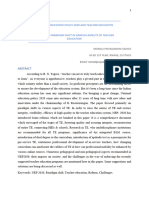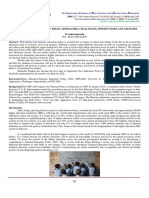INVESTIGATING STRATEGIES FOR BUILDING THE
CAPACITY OF TEACHERS, SCHOOL LEADERS, AND
EDUCATION ADMINISTRATORS TO EFFECTIVELY
IMPLEMENT NEP 2020 INITIATIVES
QUESTIONNAIRE:
How familiar are you with the National Education Policy (NEP) 2020?
A) Very familiar
B) Somewhat familiar
C) Heard of it but not familiar
D) Not familiar at all
What do you think is the main goal of NEP 2020?
A) Increase school funding
B) Improve the quality of education and literacy rates
C) Reduce school days
D) Expand private schooling
How do you perceive the impact of NEP 2020 on foundational literacy and numeracy?
A) Significant positive impact
B) Some positive impact
C) No impact
D) Negative impact
What is your opinion on NEP 2020’s focus on early childhood education?
A) Strongly supports it
B) Supports it
C) Neutral
D) Opposes it
How effective do you believe NEP 2020’s approach to reducing dropout rates will be?
1|Page
� A) Very effective
B) Moderately effective
C) Slightly effective
D) Not effective
What are your views on the proposed curriculum changes under NEP 2020?
A) Highly beneficial
B) Beneficial
C) Neutral
D) Not beneficial
How do you feel about integrating vocational education from Grade 6 as proposed by
NEP 2020?
A) Strongly agree
B) Agree
C) Disagree
D) Strongly disagree
What is your opinion on NEP 2020’s language policy promoting multilingualism?
A) Strongly supportive
B) Supportive
C) Neutral
D) Unsupportive
How do you rate the importance of the 4-year integrated B.Ed. program proposed by
NEP 2020?
A) Very important
B) Important
C) Slightly important
D) Not important
How do you view NEP 2020’s efforts to ensure equity and inclusion in education?
2|Page
� A) Very effective
B) Effective
C) Neutral
D) Ineffective
What is your opinion on the proposed changes to board exams under NEP 2020?
A) Highly supportive
B) Supportive
C) Neutral
D) Opposed
How do you feel about the emphasis on multidisciplinary learning approaches in
higher education as proposed by NEP 2020?
A) Very supportive
B) Supportive
C) Neutral
D) Unsupportive
What is your view on the role of the National Education Technology Forum (NETF)
in promoting technology use in education?
A) Very positive
B) Positive
C) Neutral
D) Negative
How important do you believe continuous professional development programs for
teachers are under NEP 2020?
A) Very important
B) Important
C) Slightly important
D) Not important
3|Page
� What is your opinion on the concept of School Complexes for resource sharing under
NEP 2020?
A) Highly beneficial
B) Beneficial
C) Neutral
D) Not beneficial
How do you perceive the approach of using formative and summative assessments
under NEP 2020?
A) Very effective
B) Effective
C) Neutral
D) Ineffective
What is your stance on integrating co-curricular activities and life skills into the
curriculum as proposed by NEP 2020?
A) Strongly supportive
B) Supportive
C) Neutral
D) Unsupportive
How do you view the establishment of a National Research Foundation for promoting
research in higher education?
A) Very supportive
B) Supportive
C) Neutral
D) Unsupportive
What are your thoughts on the Academic Bank of Credits for storing and
transferring academic credits?
4|Page
� A) Very positive
B) Positive
C) Neutral
D) Negative
How important do you think promoting lifelong learning and adult education
programs is under NEP 2020?
A) Very important
B) Important
C) Slightly important
D) Not important
RESEARCH OBJECTIVES:
Research objectives to explore for investigating strategies to build capacity for NEP 2020
initiatives:
1. Assessing Technological Readiness:
Evaluate the preparedness of educators and administrators to incorporate digital tools
and technology-driven teaching methods as proposed by NEP 2020.
Identify gaps in technical skills and digital literacy among educators to effectively
implement NEP initiatives.
2. Enhancing Subject-Specific Competence:
Assess the subject-specific knowledge gaps that educators face under the new NEP
2020 curriculum frameworks.
Analyse the effectiveness of specialized professional development programs in
enhancing subject-matter expertise among educators.
3. Strengthening New Teacher Induction:
Research the effectiveness of mentorship and induction programs for newly recruited
teachers in aligning with NEP 2020 goals.
5|Page
� Investigate the impact of structured induction programs on the retention and
performance of new teachers.
4. Promoting Blended Learning Models:
Compare the effectiveness of blended learning models (combining online and face-to-
face training) for capacity building in educators.
Analyze the long-term benefits of blended learning approaches for sustaining NEP 2020
reforms.
5. Addressing Urban-Rural Disparities:
Evaluate the specific challenges faced by educators in urban vs. rural settings in
adopting NEP 2020 curricular reforms.
Investigate the effectiveness of capacity-building programs tailored to the needs of
urban and rural educators.
6|Page
�MODEL:
The 5+3+3+4 Formula in the Education System: NEP 2020
The Union Cabinet of India approved the National Education Policy (NEP) on July 28th, 2020,
replacing the 34-year-old policy after extensive consultations with stakeholders at various
levels.
NEP 2020 introduces a new 5+3+3+4 structure to replace the 10+2 schooling system. The
actual number of school years remains the same, but the new system integrates playschools
into formal education, enhancing accessibility and quality.
Breakdown of the 5+3+3+4 Structure
7|Page
�1. Foundational Stage (5 years)
- Ages: 3-8 years
- Classes: Anganwadi/pre-school to Class 2
- Focus: Language development, play-based learning.
2. Preparatory Stage (3 years)
- Ages: 8-11 years
- Classes: 3rd to 5th grades
- Focus: Language development, numeracy skills, activity-based learning.
3. Middle Stage (3 years)
- Ages: 11-14 years
- Classes: 6th to 8th grades
- Focus: Critical learning objectives, experiential learning in various subjects.
4. Secondary Stage (4 years)
- Ages: 14-18 years
- Classes: 9th to 12th grades
- Focus: Multidisciplinary education, critical thinking, subject choice based on interests.
Benefits of the 5+3+3+4 Structure
- Strong Foundation: Emphasizes early childhood education (ages 3-6) to ensure a solid
learning base.
- Enhanced Career Counselling: Supports multidisciplinary education and subject selection
from middle school, requiring better guidance for informed career decisions.
The 5+3+3+4 structure aims to provide a seamless and inclusive transition from pre-school to
higher education, focusing on holistic development.
8|Page




















































































